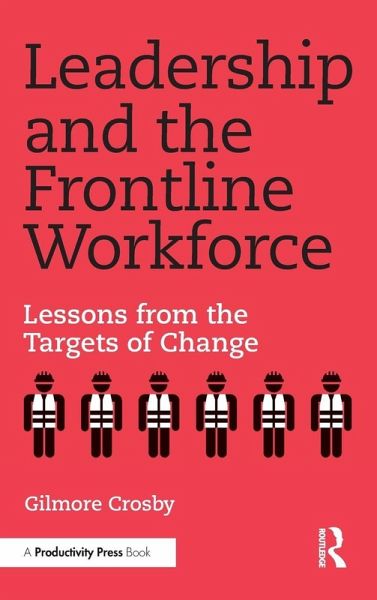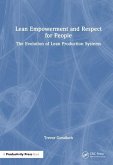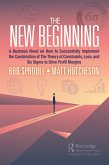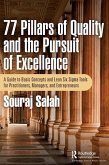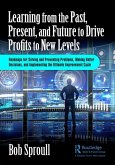- Gebundenes Buch
- Merkliste
- Auf die Merkliste
- Bewerten Bewerten
- Teilen
- Produkt teilen
- Produkterinnerung
- Produkterinnerung
This book explains practical culture change based on engaging frontline workers and citizens in real engagements including at aluminum fabrication and bauxite refineries, social service agencies, and citizen engagement projects.
Andere Kunden interessierten sich auch für
![Learn to See the Invisible Learn to See the Invisible]() Michael BremerLearn to See the Invisible187,99 €
Michael BremerLearn to See the Invisible187,99 €![Lean Empowerment and Respect for People Lean Empowerment and Respect for People]() Trevor GundlachLean Empowerment and Respect for People132,99 €
Trevor GundlachLean Empowerment and Respect for People132,99 €![Driving Justice, Equity, Diversity, and Inclusion Driving Justice, Equity, Diversity, and Inclusion]() Kristina KohlDriving Justice, Equity, Diversity, and Inclusion184,99 €
Kristina KohlDriving Justice, Equity, Diversity, and Inclusion184,99 €![The New Beginning The New Beginning]() Bob SproullThe New Beginning127,99 €
Bob SproullThe New Beginning127,99 €![77 Pillars of Quality and the Pursuit of Excellence 77 Pillars of Quality and the Pursuit of Excellence]() Souraj Salah77 Pillars of Quality and the Pursuit of Excellence176,99 €
Souraj Salah77 Pillars of Quality and the Pursuit of Excellence176,99 €![Learning from the Past, Present, and Future to Drive Profits to New Levels Learning from the Past, Present, and Future to Drive Profits to New Levels]() Bob SproullLearning from the Past, Present, and Future to Drive Profits to New Levels176,99 €
Bob SproullLearning from the Past, Present, and Future to Drive Profits to New Levels176,99 €![Breakthrough Agile Breakthrough Agile]() Christian CaterBreakthrough Agile142,99 €
Christian CaterBreakthrough Agile142,99 €-
-
-
This book explains practical culture change based on engaging frontline workers and citizens in real engagements including at aluminum fabrication and bauxite refineries, social service agencies, and citizen engagement projects.
Hinweis: Dieser Artikel kann nur an eine deutsche Lieferadresse ausgeliefert werden.
Hinweis: Dieser Artikel kann nur an eine deutsche Lieferadresse ausgeliefert werden.
Produktdetails
- Produktdetails
- Verlag: Taylor & Francis Ltd
- Seitenzahl: 248
- Erscheinungstermin: 2. Juli 2025
- Englisch
- Abmessung: 229mm x 152mm
- ISBN-13: 9781041027966
- ISBN-10: 1041027966
- Artikelnr.: 72877350
- Herstellerkennzeichnung
- Libri GmbH
- Europaallee 1
- 36244 Bad Hersfeld
- gpsr@libri.de
- Verlag: Taylor & Francis Ltd
- Seitenzahl: 248
- Erscheinungstermin: 2. Juli 2025
- Englisch
- Abmessung: 229mm x 152mm
- ISBN-13: 9781041027966
- ISBN-10: 1041027966
- Artikelnr.: 72877350
- Herstellerkennzeichnung
- Libri GmbH
- Europaallee 1
- 36244 Bad Hersfeld
- gpsr@libri.de
Gilmore Crosby's mission is to help create a better future for humanity. He believes the most reliable means for doing so is to apply and spread the wisdom and methods of Kurt Lewin. Crosby's credo is asserted in the title of his book: "Planned Change: Why Kurt Lewin's Social Science is still best practice for Business Performance, Change Management & Human Progress." He is concerned that the OD profession is distracted by beliefs such as that the human condition has significantly changed (VUCA) and by the search for what is "new." Crosby asserts that most of what passes as "new" is more hype than true substance. Instead, Crosby advocates that change agents from all walks of life would be wise to learn and apply Lewin's universal theory of social science, including concepts such as group dynamics, group decision, the social construction of reality, re-education, field theory, change as three steps, and the democratic principles of leadership. When integrated these concepts form a systemic approach that can be applied by hourly workers, community organizers, and PhDs alike. Crosby's career dates back to 1984, following in the footsteps of his father's OD career which traces back to 1953 and Lewin's inner circle. While embracing the past, Crosby experiments in the present, conducting T-group learning in organizations, online T-groups, and various uses of new technology and social media. His most recent book, Diversity without Dogma, applies Lewinian social science to addressing racism and any form of prejudice.
Chapter One: View from the targets Chapter Two: Lewinian organization
development (OD) Chapter Three: Alignment and the front lines (SATA)
Chapter Four: Before and after - A Union VP meets Lewinian OD Chapter Five:
A blue-collar OD guy - An electrician meets Lewinian OD Chapter Six: A
blue-collar Jamaican Chapter Seven: The blue-collar wisdom of William
Crosby Chapter Eight: A blue-collar OD guy - Cotton Mears Chapter Nine:
Examples from my father's lifetime of OD work Chapter Ten: From conflict to
collaboration - A true T-group story Chapter Eleven: Involving the front
lines in a social service agency Chapter Twelve: Behavioralizing culture -
goal clarity, role clarity, decision clarity and feedback Chapter Thirteen:
Conflict utilization Chapter Fourteen: Implications for leadership Appendix
A: The Interpersonal Gap meets Toltec wisdom Appendix B: Behavior
description quiz (DEI version) Appendix C: The PINCH Model (article by Mark
Horswood) Appendix D: Managing conflict in community development Appendix
E: Sponsor, Agent, Target, Advocate (SATA) Appendix F: KRID (Adapt/Adopt)
Appendix G: Cotton Mears flipchart visual aids Bibliography
development (OD) Chapter Three: Alignment and the front lines (SATA)
Chapter Four: Before and after - A Union VP meets Lewinian OD Chapter Five:
A blue-collar OD guy - An electrician meets Lewinian OD Chapter Six: A
blue-collar Jamaican Chapter Seven: The blue-collar wisdom of William
Crosby Chapter Eight: A blue-collar OD guy - Cotton Mears Chapter Nine:
Examples from my father's lifetime of OD work Chapter Ten: From conflict to
collaboration - A true T-group story Chapter Eleven: Involving the front
lines in a social service agency Chapter Twelve: Behavioralizing culture -
goal clarity, role clarity, decision clarity and feedback Chapter Thirteen:
Conflict utilization Chapter Fourteen: Implications for leadership Appendix
A: The Interpersonal Gap meets Toltec wisdom Appendix B: Behavior
description quiz (DEI version) Appendix C: The PINCH Model (article by Mark
Horswood) Appendix D: Managing conflict in community development Appendix
E: Sponsor, Agent, Target, Advocate (SATA) Appendix F: KRID (Adapt/Adopt)
Appendix G: Cotton Mears flipchart visual aids Bibliography
Chapter One: View from the targets Chapter Two: Lewinian organization
development (OD) Chapter Three: Alignment and the front lines (SATA)
Chapter Four: Before and after - A Union VP meets Lewinian OD Chapter Five:
A blue-collar OD guy - An electrician meets Lewinian OD Chapter Six: A
blue-collar Jamaican Chapter Seven: The blue-collar wisdom of William
Crosby Chapter Eight: A blue-collar OD guy - Cotton Mears Chapter Nine:
Examples from my father's lifetime of OD work Chapter Ten: From conflict to
collaboration - A true T-group story Chapter Eleven: Involving the front
lines in a social service agency Chapter Twelve: Behavioralizing culture -
goal clarity, role clarity, decision clarity and feedback Chapter Thirteen:
Conflict utilization Chapter Fourteen: Implications for leadership Appendix
A: The Interpersonal Gap meets Toltec wisdom Appendix B: Behavior
description quiz (DEI version) Appendix C: The PINCH Model (article by Mark
Horswood) Appendix D: Managing conflict in community development Appendix
E: Sponsor, Agent, Target, Advocate (SATA) Appendix F: KRID (Adapt/Adopt)
Appendix G: Cotton Mears flipchart visual aids Bibliography
development (OD) Chapter Three: Alignment and the front lines (SATA)
Chapter Four: Before and after - A Union VP meets Lewinian OD Chapter Five:
A blue-collar OD guy - An electrician meets Lewinian OD Chapter Six: A
blue-collar Jamaican Chapter Seven: The blue-collar wisdom of William
Crosby Chapter Eight: A blue-collar OD guy - Cotton Mears Chapter Nine:
Examples from my father's lifetime of OD work Chapter Ten: From conflict to
collaboration - A true T-group story Chapter Eleven: Involving the front
lines in a social service agency Chapter Twelve: Behavioralizing culture -
goal clarity, role clarity, decision clarity and feedback Chapter Thirteen:
Conflict utilization Chapter Fourteen: Implications for leadership Appendix
A: The Interpersonal Gap meets Toltec wisdom Appendix B: Behavior
description quiz (DEI version) Appendix C: The PINCH Model (article by Mark
Horswood) Appendix D: Managing conflict in community development Appendix
E: Sponsor, Agent, Target, Advocate (SATA) Appendix F: KRID (Adapt/Adopt)
Appendix G: Cotton Mears flipchart visual aids Bibliography

